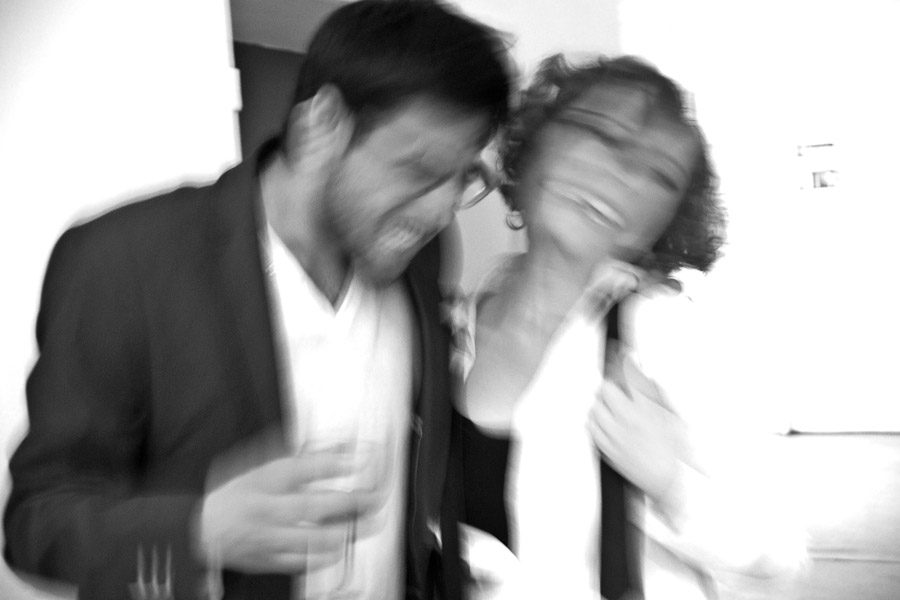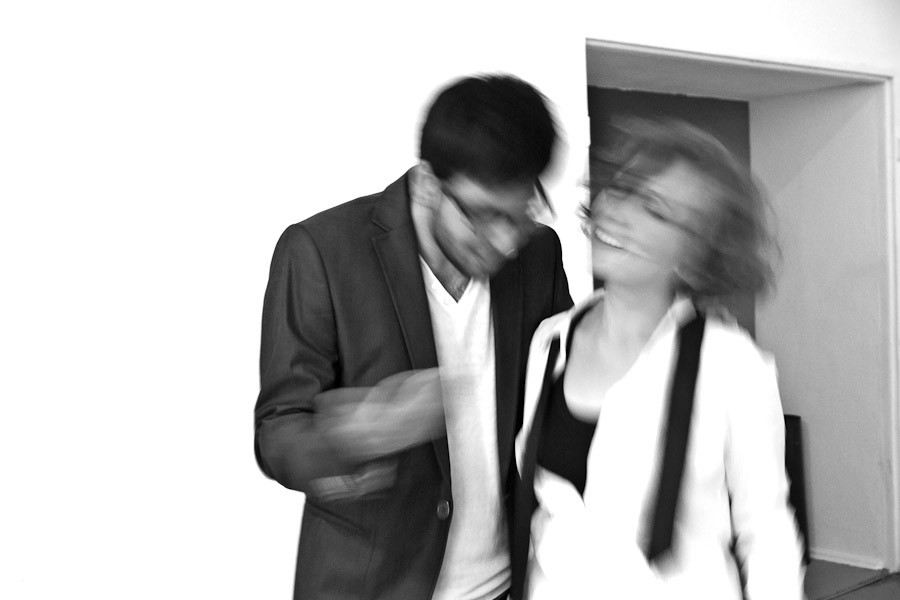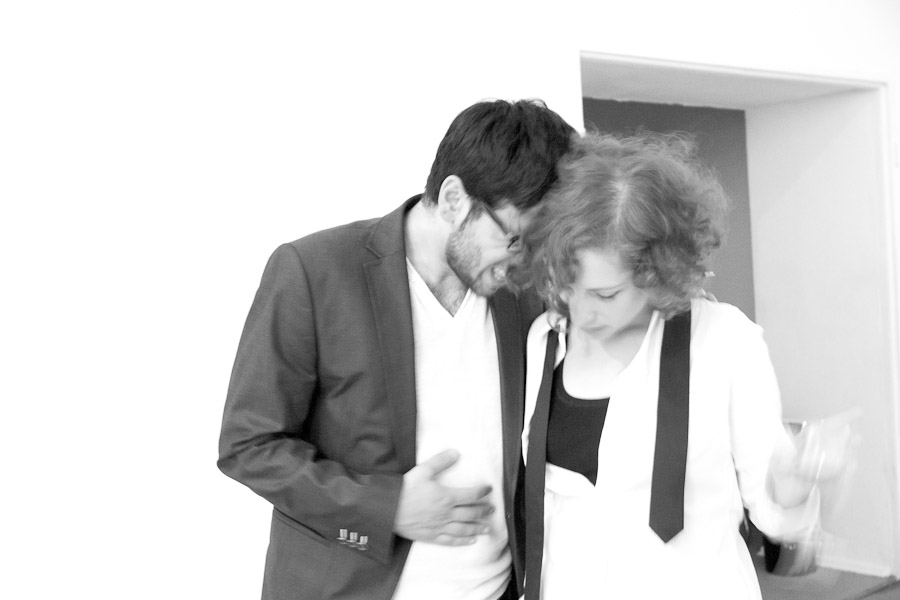ANGRY BIRDS SING AGAIN
ANGRY BIRDS SING AGAIN
(Excerpts)
MARIANNA
I can’t believe it. You were here, sitting in my armchair—the filter of my fag is still damp from your lips—and you didn’t wait for me. Did they come and fetch you? I’m pretty sure they didn’t; I’d be the first to hear and the walls wouldn’t have stayed this white. So where are you? Why aren’t you here? I was by the Black Sea. Two human flies buzzed around me. That’s not a good sign. They were wearing helmets and hanging by threads from jet-propelled parachutes. I saw them from a long way off and at first I wasn’t sure if they were there for me. No one could know I was there. I took a dolmuş from my villa, then a bus, then a taxi and travelled until there was green all around me and the Black Sea was a dark blue line on the horizon. I jumped into the salty water. It stung my eyes, but I had to clean them. My ears filled with the roar of the waves and for a moment I couldn’t feel it—couldn’t feel that deep fear that I wouldn’t find you.
The villa was allocated to me by the Protection of the Nonstitution and sits high up above the Bosporus. There are porters at the entrance; they take it in turns to make sure I don’t trick them or bewitch them—who knows what they’re afraid of—and at night they send their guard dogs out to stalk the garden.
Beyond the garden is a wood and in the wood is a marquee of robust cellophane, big enough for an entire wedding party. There’s a chandelier hanging inside the marquee. The cellophane sides quiver in the wind and you can see the stars through the see-through plastic ceiling.
I spent a whole night in there, wondering what it would be like to dance to ‘Famous Blue Raincoat’ under the plastic-covered sky with you and the others. Perhaps I should say sing along—you can’t really dance to Leonard.
I saw him. The master. He was standing in front of me and yes, his coat was torn at the shoulder. I saw his face big on the houses and bought myself a ticket for the concert. I had a seat high up on the right, looking down on the crown of his hat. His backing singers were blond and did backward rolls as they sang. I bought myself a coffee and fought my way to the stage. Just as I arrived in front of him, he sang ‘So Long, Marianne’, and for a moment I imagined that you were there, not far from me, singing along. Then I was thrown back to Tarabya—back to my villa and my German war graves, where I’m allowed to stay until I’ve found you all.
They assume that you’re hiding somewhere in Fatih. Who knows why, but it gives me a reason to climb Pierre Loti and look down on the city, drinking glass after glass of çay courtesy of the Protection of the Nonstitution. I have learnt to get a grip on myself when people talk about Turkish Hezbollah. I no longer laugh as loudly and have bought myself an outsize pair of Ray Bans to hide my tears of laughter.
‘Isn’t there someone called “Hamas” in that terror group?’ I splutter into my glass and apologise. For some reason, they are very patient with me. They give me time, they give me money, they pay for me to holiday on the Bosporus and then they ask how they can help me. They don’t ask me about my methods and I’m pretty sure they don’t read my correspondence.
The ambassador wants to see me tomorrow. I hope it’s only routine. Maybe he receives all informers. Or maybe he doesn’t, in which case I’ll tell him a bit about the rise of anti-Semitism in Germany.
I recognised one of the flies when I was by the sea—one of the ones who were buzzing around my head. Definitely another Protector of the Nonstitution. He was at the consulate yesterday when I went to the Fazıl Say concert. Fazıl Say is also an informer, by the way; he makes zombie-like faces when he grips the piano keys.
I ended up in a club. Wondered who would call a vast room with a stucco ceiling ‘Ghetto’.
Then I went up to the terrace of Büyük Londra and felt a stabbing desire to stay there forever.
There was a fine film over everything—over the view of the Bosporus and the lights which plotted the shape of the hills and the houses and all the people inside the houses and the bridge to Asia beneath its haze of traffic fumes. I breathed it in—I could taste it—and went to the bar for my next rakı. There was an actor sitting there. Most people in Germany know him from a film where he drives head-on into a wall; I know him from dancing in the Ballhaus in Naunynstrasse. We didn’t talk much; he rolled cigarettes, his hat falling lower and lower over his face, and I drank. I pulled my dyed curly hair back off my forehead and tucked it behind my ears. I wasn’t in love, don’t get me wrong, but I thought to myself: here is someone like us—someone else who’s trying to disappear.
Before I could muster the courage to say anything, he’d put fifty lire on the counter and left. I shuffled down the gold-trimmed red carpet, one step at a time, past the jukebox that played songs I didn’t know, then sat down on the stairs, exhausted, suddenly weighed down again by the fear that I wouldn’t find you. Russian tourists in string vests came and put their arms around me and took photos, as if I were a statue. People came and went; I stayed. I was like a plant growing in the middle of the stairs; I decided to put down roots in the marble steps.
Eventually they threw me out.
You can’t want to get away when you are away.
Today I decided to go to the Black Sea. And you were here in my room. Why did you have to come when I was out? Why don’t we ever get to see each other?
The human flies are a sign that they’re hard on my heels. I hope I’m hard on yours. Take care, Emre, they shoot without warning. If I find you before they do, I know people who will help us to get away.
I have Black Sea sand in my mouth and it’s raining. I run my tongue all over my face.
From now on, you are Emre and I am Sascha. Like Henry Miller calling himself ‘Val’ and June ‘Mona’.
I told a woman in Cihangir about us; she says she’ll take us in. Come back.
DENIZ
I was there. I was in your room and opened my mouth to the rain. Then the Nonstitution Officers threw me out. They thought I was the porter’s cousin and they don’t waste precious time torturing someone like that—never mind the fact that they usually delegate torture to others. Who knows, maybe they’ve delegated me to Syria and I’ll soon be staring into Assad’s ugly bureaucrat’s face, tied to a broken chair, with my earlobes wired up. The whole world will be up in arms with him, and your boys from the Nonstitution will laugh into their fists. I was at the Cohen concert, too, by the way; I stood behind a woman with curly hair when he played ‘So Long, Marianne’.
Now I’m back, among all this junk you’re always running away from, the asphalt weighing down my feet like lumps of concrete. I actually feel relatively safe here. They only know who I am when we’re together; without you, my camouflage as the porter’s cousin is perfect. They even let me into the committee meetings on the murders committed by the National Socialist Underground. They take my passport from me (I really am using the ‘Emre’ identity, by the way) and press an orange ticket into my hand saying GUEST, and I say thank you very politely because now, at last, it’s official—now I know which box I belong in. Then I spend hours sitting in the head of the minister under interrogation, which is to say, I sit in the gallery above him, facing the committee like him, and when he speaks, in his deep, professional voice, never at a loss for words, it’s as if I were speaking, as if the committee were interrogating me. At times, this seems so real to me that I feel almost smug that I am making such a mockery of the committee and that the committee allows itself to be made a mockery of. It has no choice, after all; it can question only up to a certain point and no further, just as this whole country can question only up to a certain point and no further—the point where the questions start to cancel each other out and the only protests are about quite bearable things—things which (as the whole country is forever saying) only happen abroad, in far-flung places and totalitarian regimes, not here in democratic Germany! I, meanwhile, can make a mockery of the committee by picking up my interrogation at that precise point where it leaves off, unable or unwilling to see beyond the confines of this country. I can go on for hours, repeating myself on banal subjects at great length in the voice of an important, confident, superior man. I tell them I did all the right things. I tell them I would do the same today. I tell them that now we all know that everything in this country is as it should be (not counting those little things that actually work pretty well, if you look at other countries), what we have to do is re-establish trust in the country’s security authorities—and it would be extremely unhelpful if we started asking probing questions.
Sascha!
Call me Emre.
Forget about Henry Miller. A man who goes on for pages and pages, working himself into a sexual frenzy over a virgin’s blood after deflowering her against her will with great relish, is neither man, nor woman nor trans. He is a pathetic wretch—though, of course, like every fucking wretch, he has a story to tell, however hopeless the situation.
Sascha! This isn’t like after the elections in Berlin when you turned up with three baseball bats and we played inglorious bastards. This isn’t about the Nazis any more; it’s deeper seated than that. Deeper in society, deeper in you and me, deeper in this state. This deep state.
SASCHA
This is it, Emre, we’re at war. Are you still here? I’m hoping the answer is no, but if it is, you might know that war has marched into this country, but you maybe won’t feel it. The West sells war and the East buys it. I’m in between, in a thin wall of heat.
When I arrived in Antakya, together with another informer who, like me, was co-operating with the state as a form of cover, the first rockets were falling on Turkish soil. We wanted to get closer to the border, maybe even cross over into Syria to get some idea of what was going on. Antakya is fifty kilometres from the border and a kind of Biblical paradise. Biblical anyway. Noah cooked asura here for his passengers and Moses drove his walking stick into the ground to tap the water of eternal life. (It grew into the oldest tree in the Middle East.) We had other reasons for going. The south-eastern region of Hatay is said to be the most liberal in the land; Alevites, Armenians, Jews and Christians, not to mention lefties and anarchists, have been living here together for centuries. We’d heard that this was soon to change—that the war in Syria was being used to destabilise the area. We wanted to know what that meant.
The men sat at a table strewn with newspapers and kept pouring more çay for us. They talked fast; I understood only scraps: CIA, Mossad, refugees, fake refugees. They were all teachers. On Human Rights’ Day they’d organised a demonstration—the biggest in the history of Hatay. Fifteen thousand people had filled the streets of the small town and shouted for peace with their Syrian sisters and brothers. They shouted no to arms exports, they shouted no to the mercenaries who were being paid to infiltrate the refugee camps.
We staggered out in confusion. We’d lost our bearings. We didn’t know what to believe. We knew that armed men walked through the town at night, frightening the population of Antakya.
We went into a kuaför salon and held out our fingernails to make the woman speak more freely. The words came gushing out of her. She was afraid at night, she was afraid of the war that was going to break out. She painted our nails blue and dark red and told us the story of her family. She said that Turkey and Syria were sisters; they connected families. Antakya had always been open to everyone and that was a good thing—why were the Western powers paying men to come here and change everything?
We looked at each other.
Another woman came and read our coffee grounds.
Several more women came; the salon filled up. The women spoke Arabic to each other and laughed and we laughed with them; nobody wanted anyone to go. Children ran in and shot at us with plastic guns. Men smoked water pipes outside the door and the scent mingled with the smell of the nail varnish. It was getting dark by the time we left. We found ourselves on a terrace where a performance was to take place. We looked at the mountains around us and, far away on a hill, we saw Atatürk’s profile light up. People were drinking water and beer. I took photos of bare toes on rugs, the full moon and Atatürk.
On the next terrace, a man came up and asked if we were journalists—he’d like to talk to us. After all we’d heard, he could have been from the CIA or Mossad, but maybe he was just some idiot coming on to us. He might even have been a genuine refugee, but there was no way of knowing. No one here looks after the genuine refugees; everyone’s afraid they’ve come to colonise them—moved into the camps with their families to creep out at night and poison the area. People here shoot at hospital staff when they try to treat Syrian asylum seekers. Their tactic is to destabilise; their aim is no secret.
And do you know what? The Water of Eternal Life that flows underground in this part of the world is a fucking lie that even the faithful no longer respect. They wash their rifles in it.
We staggered into the blue of our room. The room was Barbara’s, a nun who had come here from Germany.
We abandoned our plans to get closer to the border. We had neither bulletproof vests nor travel permits, and the region was under fire.
After interviews in streets that were hot from the generators (sometimes the only source of electricity) and nights on terraces between mountains—after rakı and endless, endless questions, we caught the plane back to Istanbul. Even before we were back, the first messages came from people who knew where I’d been, asking if I was still alive. Turkey has declared war on Syria and is asking for support from NATO. At the same time, Turkey is shaking hands with Iran, Hamas and Gerhard Schröder. And Putin has plans for Syria and is getting involved big time. The borders are governed by men who are paid by the USA. Emre, when what’s coming comes, the jokes about a third world war won’t be jokes any more.
Tr. Imogen Taylor




